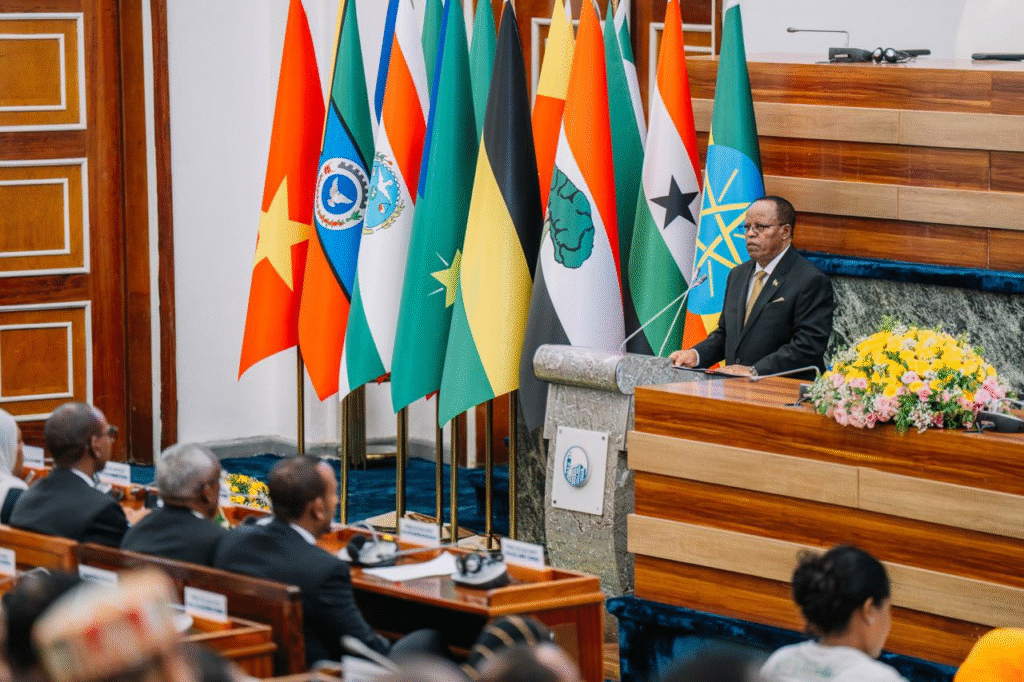President Taye Astke-Selassie on Monday (October 06) addressed the joint session of the House of Peoples’ Representatives and the House of Federation of the Federal Democratic Republic of Ethiopia. The President opened his remarks by situating the country’s progress within the broader historical journey of resilience. The past year, he noted, was not only one of substantial achievements but also one in which Ethiopia laid the foundation for far greater success in the years to come. The inauguration of the GERD and the start of gas extraction symbolized the fruition of years of perseverance and the transition from aspiration to realization.
In the economic domain, the President reaffirmed the government’s continued commitment to macroeconomic reform and structural transformation. He said the government has introduced rapid and broad-based economic reforms designed to repair century-oldeconomic fractures and put the country on a path toward prosperity. These reforms have strengthened government revenues, improved export trade performance, and increased foreign currency reserves. The President underscored that the country’s development direction has been changing meaningfully from reliance on specific sectors toward diversification and the building of multi-sectoral economic foundations.
According to the President, Ethiopia’s economy grew by 9.2 percent during the 2017 Ethiopian fiscal year, with substantial progress across major sectors. Agricultural production rose by 24.7 percent, from 1.2 billion quintals in 2016 E.C. fiscal year to 1.57 billion quintals in 2017 E.C,while industrial capacity utilization climbed from 59 to 65 percent. Gold production expanded nearly tenfold, from 3.9 to 38.87 tons, and cement production grew from 7.5 million to 9.1 million tons. Export earnings reached a historic record of 8.3 billion USD, an increase of 115.8 percent compared to the previous year.
The President emphasized that these achievements were the result of deliberate policy choices and bold reforms that sought to shift Ethiopia from dependence to self-reliance, from debt to fiscal sovereignty, from rain-fed vulnerability to digital and industrial resilience, and from fragmented economic activities to integrated and inclusive development.
In addressing Ethiopia’s foreign relations and regional cooperation, the President reaffirmed that the country’s diplomacy is firmly rooted in national interest and the dignity of its citizens. He highlighted that Ethiopia’s geostrategic posture has shifted from a position of vulnerability to one of strength and advantage. Central to this transformation has been the government’s consistent diplomatic engagement on two strategic fronts: the equitable and reasonable utilization of rivers that originate from the country’s territorial womb, and the legitimate aspiration for reliable access to a sovereign sea. Through persistent and principled diplomacy, the President stated, Ethiopia succeeded in bringing these matters to international recognition.
The completion of the GERD, once fraught with challenges, stands for a diplomatic and developmental triumph. In this regard, the President said, “We were able to complete and inaugurate the Grand Ethiopian Renaissance Dam (GERD) by saving it from the crises.” Similarly, he said, “We have also asserted and elevated our natural right to access the sea,” which has gained increasing legitimacy and support both regionally and internationally. Furthermore, under the government’s “citizens-first” foreign policy principle, the country has intensified efforts to repatriate citizens who were exposed to hardship abroad, established mechanisms for diaspora engagement, and expanded opportunities for Ethiopians and people of Ethiopian origin to participate in national development. The President also underscored Ethiopia’s contribution to regional cooperation and environmental sustainability through the expansion of the flagship Green Legacy initiative across neighboring countries.
The President reiterated that Ethiopia’s foreign policy will continue to give precedence to neighboring countries and to the pursuit of peace through dialogue and cooperation. Over the years, Ethiopia has strengthened its regional relations through peaceful engagement, infrastructure development, and trade cooperation, adding: “problems have been resolved peacefully, and conflicts with any neighboring country have been avoided.” These efforts, he affirmed, will continue with renewed vigor to consolidate peace, resolve disputes diplomatically, and promote integration through connectivity and shared economic growth.
Beyond the region, the President said Ethiopia will stive to maintain balance in international power relations while expanding cooperation and mutual benefit. He further reaffirmed that the country would work to enhance its participation and influence in international fora, promote shared interests, and play an active and constructive role in global affairs.

